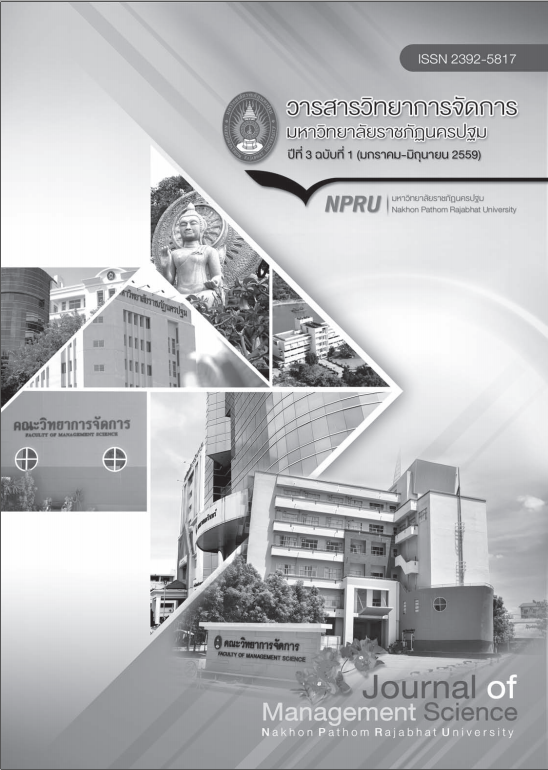Factors affecting the public mind of Kanchanaburi Rajabhat University students
Main Article Content
Abstract
The aims of this research were 1) to study factors affecting the public mind of Kanchanaburi Rajabhat University students and 2) to study the correlation between factors that affect the public mind of Kanchanaburi Rajabhat University students. The data consisting of 364 samples were collected based on quantitative research. The variables were defined using a deductive method. The questionnaire was created by various theories. The correlation statistic analysis was used for inferential analysis. Also, the multiple regression analysis was used for hypothesis testing involving with the independence of variables which explained the results and discussion of this research.
From this study, most were female with a percentage of 70.3, the ages were between 18-20 years old with a percentage of 47.0 Of these students 39.0 percent were freshmen and their parents’ occupation are business owners/ traders with a percentage of 36.3. The family incomes were between 20,000-24,999 baht with a percentage of 25.5. Also, most students precipitated in university activities regularly with a percentage of 43.4%.
The results revealed that the factors affecting the public mind of Kanchanaburi Rajabhat University students showed in order were as accompanied by friends (β = 0.52), school (β = 0.34), attitude (β = 0.13) and family (β = 0.13) with the predictive power of 0.84. The correlation between factors that affect the public mind of Kanchanaburi Rajabhat University students were related significantly which showed the highest relationship was attitude with family (r = 0.60). The second was school with accompanied by friends (r = 0.58) and the third was family with school (r = 0.50).
Article history : Accepted 26 January 2016
SIMILARITY INDEX = 0.98
Article Details
The views and opinions of the article appearing in this journal are those of the author. It is not considered a view and responsibility of the editorial staff.
References
โกวิทย์ พวงงาม. (20 -26เมษายน2550). การพัฒนาสังคมไทยวันนี้กับคุณธรรมและจิตสำนึกที่หายไป. วารสารสยามรัฐวิจารณ์, 54 (30), 3.
ณัฐณิชากร ศรบริบูรณ์. (2550). การพัฒนาโมเดลเชิงสาเหตุของจิตอาสาของนักเรียน มัธยมศึกษาตอนปลายในโรงเรียนลังกัดสำนักงานคณะกรรมการการศึกษาขั้นพื้นฐาน. วิทยานิพนธ์ปริญญามหาบัณฑิต, จุฬาลงกรณ์มหาวิทยาลัย.
นริศรา ริชาร์ดสัน. (2546). ปัจจัยที่ส่งผลต่อการให้เหตุผลเชิงจริยธรรมด้านความเสียสละของนักเรียนชั้นประถมศึกษาตอนปลาย โรงเรียนวัดธาตุทอง เขตวัฒนา กรุงเทพมหานคร. สารนิพนธ์ปริญญามหาบัณฑิต. คณะศึกษาศาสตร์. สาขาจิตวิทยาการศึกษา. มหาวิทยาลัยศรนครินทรวิโรฒ ประสานมิตร.
พิชญาณี กิติกุล.(2549). วิธีวิจัยทางธุรกิจ. กรุงเทพมหานคร : โรงพิมพ์จุฬาลงกรณ์มหาวิทยาลัย.
ไพบูลย์ วัฒนธรรมศิริ, และ สังคม สัญจร. (2543). สำนึกไทยที่พึงปรารถนา. กรุงเทพฯ : บริษัทโรงพิมพ์เดือนตุลา.
ศูนย์คุณธรรมและสถาบันรักลูก. (2550). ฉันจะเปลี่ยนโลกใบนี้ให้มีแต่รอยยิ้ม ในโครงการการพัฒนาคุณธรรมในชุมชน. กรุงเทพฯ : บริษัท รักลูกแฟมิลี่กรุ๊ป จำกัด.
สุจิตรา โอฬารกิจวานิช. (2547). การสนับสนุนทางสังคมกับคุณภาพชีวิตของนักเรียนมัธยมศึกษาตอนต้นจังหวัดปทุมธานี. วิทยานิพนธ์ปริญญามหาบัณฑิต. สาขาพัฒนาสังคม.มหาวิทยาลัยเกษตรศาสตร์.
สุพจน์ ทรายแก้ว. (มกราคม-มิถุนายน 2546). จิตสำนึกสาธารณะ การก่อรูปและกระบวนการ เสริมสร้าง. วารสารเพชรบุรีวิทยาลงกรณ์, 4, 55.
สำนักส่งเสริมวิชาการและงานทะเบียน. (2556). ข้อมูลงานทะเบียน. มหาวิทยาลัยราชภัฎกาญจนบุรี.
อรพินทร์ ชูชม อัจฉรา สุขารมณ์ และ อุษา ศรีจินดารัตน์ (2549). การวิเคราะห์ปัจจัยทางจิตสังคมที่สัมพันธ์กับจิตสำนึกทาง ปัญญาและคุณภาพชีวิตของเยาวชนไทย. วารสารพฤติกรรมศาสตร์. 12 (1).
อนุศักดิ์ จินดา. (2548). ความสัมพันธ์เชิงสาเหตุของตัวแปรที่ส่งผลต่อพฤติกรรมเชิงจริยธรรมของ นักเรียนชั้นมัธยมศึกษาตอนปลาย จังหวัดสระบุรี. ปริญญานิพนธ์มหาบัณฑิต.คณะศึกษาศาสตร์, สาขาการวิจัยและ สถิติทางการศึกษา. มหาวิทยาลัยศรนครินทรวิโรฒประสานมิตร.
Thoits, P. A. (June, 1982). Conceptual, Methodological and Theoretical Problem in Studying Social as a Buffer against Life Stress. Journal of Health and Behavior, 23(3), 145.


